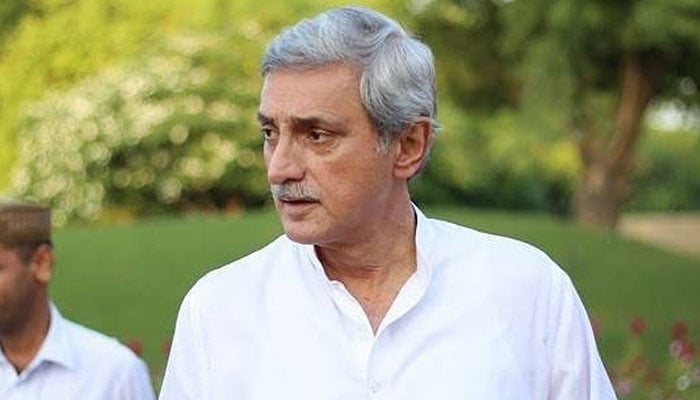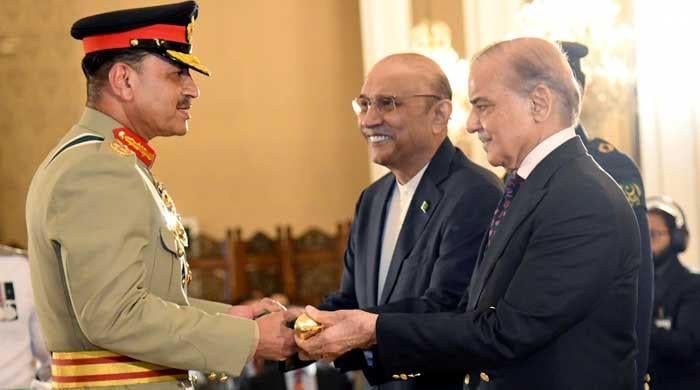Live From Courtroom No-I: When the going got tough for Tareen
A reporters account of proceedings as the SC upheld the lifetime disqualification decision
September 28, 2018

ISLAMABAD: Prayers didn’t work and the hopes of Prime Minister Imran Khan's closest friend were shattered on Thursday. The eyes of Jahangir Tareen, his son Ali, and family friend Ishaq Khakwani, who sat through the entire hearing in Courtroom No-I, were moist by the end.
Sitting with his childhood friend, Ishaq Khakwani, Tareen had pinned hopes that the country’s top court would lift the ban on his lifetime disqualification. Three judges, with a crisp expression on their faces, entered the room at 1 PM, breaking the heavy silence that hung in the courtroom to take up a landmark case, which, according to many, could change the political landscape of Pakistan.
The bench took only 15 minutes to knock senior lawyer Akram Sheikh—the counsel for Hanif Abbasi—off his feet over his request before the apex court to form a larger bench to hear his review against PM Khan’s disqualification.
“Your [Akram] review petition is dismissed,” the CJP told Sheikh, a 73-year-old seasoned lawyer.
A couple of minutes later, Tareen’s counsel, Sikandar Bashir Mohmand, took the rostrum. The PTI leader whispered to Khaqwani, stood up for a few seconds, but decided against whatever had come to his mind and returned to his seat a few feet away from Justice Nisar.
Mohmand earned the judges' wrath shortly after he commenced with his arguments, with the CJP remarking: “Creating an offshore company in the UK appears to be a complete fraud.”
Regardless, Mohmand continued, his struggle intensifying and his voice rising, which, eventually, led the judges to call it out. “Calm down; maintain the dignity of this court.
“We can order a re-investigation into the insider-trading case involving a public leader,” Justice Nisar observed, referring to Tareen. Then, addressing Mohmand, he said: “Your client has hidden all the documents ranging from trust deed to details about his offshore company.”
It was a difficult moment for the PTI leader’s son, Ali, who was accompanying his father. The bitter mood was visible in the expression on the faces of Tareen’s supporters, including senior party leaders Azam Khan Swati and Nazar Gondal.
Time and again, the top judge came down hard on Mohmand, who, consequently, apologized for the tone of his voice. Then, the CJP made reference to Punjabi proverb, to which Tareen’s lawyer retorted: “I did not belong to Punjab and that is why don’t know its answer.”
By now, Tareen had started to look nervous and hopeless and perhaps feared that the SC would order an investigation agency to probe his old cases, pertaining to the Securities and Exchange Commission of Pakistan (SECP) and the National Accountability Bureau (NAB), again.
“It’d be an interesting element, perhaps setting precedence, if the apex court orders so,” an anchorperson was heard saying in the room quietly. On the other hand, a senior lawyer affiliated with a political party observed in the context of the CJP’s harsh tone that the bench had hinted that Tareen’s December 12, 2017 judgment should have been handed over to the NAB at that time.
The “NAB may take a notice of it,” the senior lawyer said, a moment after Justice Nisar questioned the legality of millions of pounds Tareen sent to the UK. Suddenly dejected, the PTI leader stood up and headed toward the rostrum but no one joined him. Ali left his seat but did not move further.
The PTI workers, leaders, and lawyers looked worried. The decisive point was nigh. The CJP was conferring with his colleagues. In the 70 minutes of arguments, Mohmand gave his best shot to convince the judges but, by then, Tareen himself was hoping to speak to the bench. The PTI leader’s wish, however, was turned down and the CJP concluded the hearing, saying: “We dismiss this review.”
“It’s not the end of the world,” Khakwani told Tareen.









